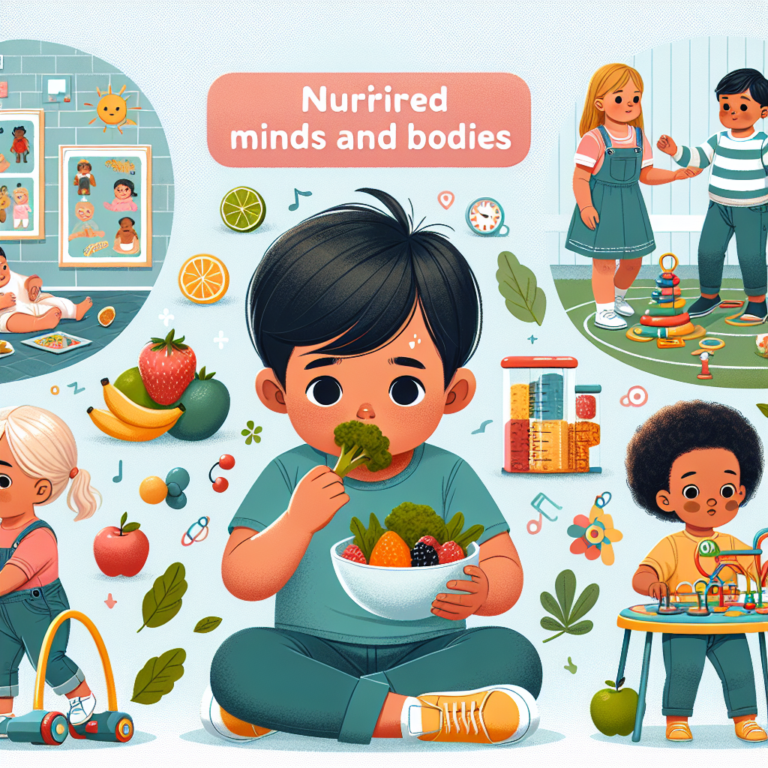In the dynamic and ever-evolving world of parenting, ensuring the health and wellbeing of toddlers stands as a paramount concern for many caregivers. This critical developmental stage, characterized by rapid growth and exploration, demands a keen understanding of both physical and mental health needs. In our comprehensive guide, we delve into the essential toddler health tips necessary for nurturing growing minds and bodies, and explore key strategies for promoting overall wellbeing. From nutrition and sleep to emotional support and physical activity, this article offers invaluable insights for raising a healthy toddler, equipping parents and guardians with the knowledge to foster a thriving environment for their little ones. Whether you’re navigating the challenges of toddlerhood or seeking to enhance your child’s health journey, this guide is an essential resource for every caregiver committed to supporting their toddler’s development.
1. “Essential Toddler Health Tips for Growing Minds and Bodies”
Ensuring the health and wellbeing of your toddler is crucial for their growing minds and bodies. During these formative years, toddlers experience rapid development, making it essential to provide them with the right support and care. Here are some essential toddler health tips to help guide you through this exciting stage.
First and foremost, nutrition plays a pivotal role in toddler health. A balanced diet rich in fruits, vegetables, whole grains, and proteins is vital for their physical and cognitive development. Offering a variety of foods helps ensure they receive the necessary vitamins and minerals. Remember, toddlers might be picky eaters, so patience and creativity in meal preparation can encourage healthy eating habits.
Physical activity is another key aspect of toddler wellbeing. Encouraging active play not only supports their physical health but also promotes brain development and social skills. Aim for at least 60 minutes of active playtime each day, which can include activities like running, jumping, or dancing. These activities help toddlers develop coordination, strength, and confidence.
Sleep is equally important for the health and growth of toddlers. Establishing a consistent bedtime routine ensures they get the recommended 11-14 hours of sleep per day. A good sleep schedule supports emotional regulation, attention span, and overall mood, which are critical for their daily activities and learning experiences.
Regular check-ups with a pediatrician are also essential in monitoring your toddler’s health and development. These visits can help track growth milestones, update vaccinations, and address any concerns you might have. It’s important to discuss any changes in behavior or health with your healthcare provider to ensure your toddler is on the right track.
Lastly, fostering emotional wellbeing is crucial. Toddlers are learning to navigate their emotions and social interactions. Providing a nurturing environment where they feel safe and loved supports their emotional growth. Encourage positive communication, validate their feelings, and model healthy emotional responses to help them develop resilience and empathy.
By focusing on these essential aspects of toddler health, you can support their growing bodies and minds, setting the foundation for a healthy and happy future.
 Also Read:
Optimizing Toddler Health and Wellbeing: Essential Nutrit...
Also Read:
Optimizing Toddler Health and Wellbeing: Essential Nutrit...
2. “Promoting Wellbeing: Key Strategies for Raising a Healthy Toddler”
Promoting the wellbeing of a toddler involves a holistic approach that nurtures both physical and emotional health. One of the key strategies is to establish a balanced diet rich in essential nutrients. Toddlers require a variety of foods that provide vitamins, minerals, and proteins to support their rapid growth and development. Incorporating fruits, vegetables, whole grains, and lean proteins can help build a strong foundation for lifelong healthy eating habits.
Regular physical activity is another crucial component in promoting toddler health. Encouraging active play not only strengthens muscles and bones but also aids in developing motor skills and coordination. Activities like running, climbing, and dancing are excellent ways for toddlers to stay active and burn off energy.
Sleep is equally vital for a toddler’s wellbeing. Establishing a consistent bedtime routine helps ensure they get the recommended amount of sleep they need for proper growth and cognitive development. A predictable routine can also provide a sense of security and calm for toddlers, making it easier for them to transition to sleep.
Emotional wellbeing is an integral part of raising a healthy toddler. Creating a nurturing and supportive environment can help toddlers develop a sense of security and confidence. Positive reinforcement, active listening, and offering comfort and guidance during emotional outbursts are essential in teaching toddlers how to manage their feelings.
Social interaction plays a significant role in a toddler’s development. Encouraging playdates and group activities helps toddlers learn important social skills such as sharing, empathy, and cooperation. These interactions are crucial for their emotional and social growth.
Lastly, regular health check-ups are crucial in monitoring a toddler’s development and catching any potential health issues early. Immunizations, dental visits, and developmental screenings ensure that toddlers remain on track with their health milestones.
By focusing on these key strategies, parents and caregivers can create a supportive environment that promotes the overall health and wellbeing of their toddlers, laying the groundwork for a healthy future.
